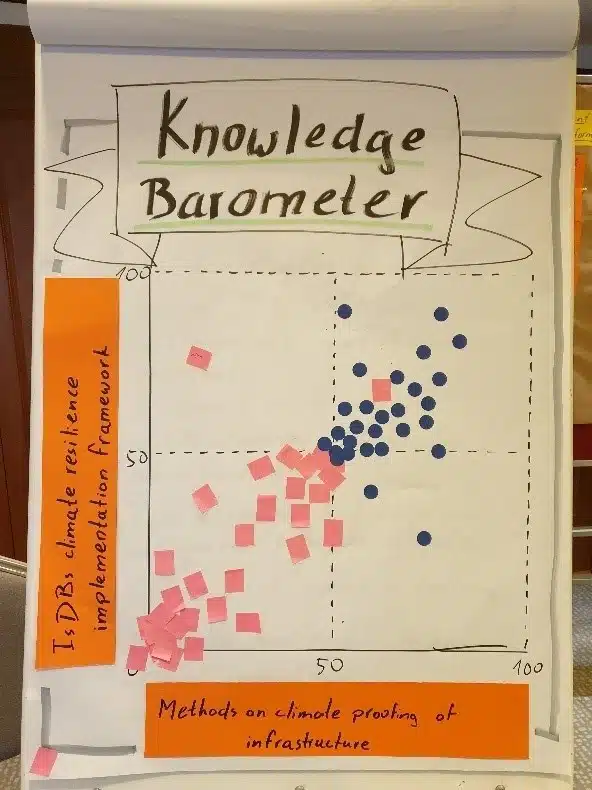By Levent Toprak
Climate change is an increasing concern for infrastructure investors all over the world, as climate risks also mean significant financial risks. The Islamic Development Bank (IsDB) has set up its climate change framework for its projects and is working on exchange of experience and capacity building in this topic both as part of this framework. This is done within IsDB as well as with partners such as GIZ Sector Project Sustainable Mobility (SUTP) and the Transformative Urban Mobility Initiative (TUMI).
The IsDB Climate Change and the Infrastructure Divisions and GIZ on behalf of the Federal Ministry for Economic Cooperation and Development (BMZ) and under the umbrella of the Transformative Urban Mobility Initiative (TUMI) conducted an internal IsDB training on “Climate Proofing of Energy and Transport Projects” in Istanbul, Turkey from 9-11 September. More than 30 project team leaders– including project managers from IsDB’s headquarters in Jeddah and its regional hubs in Ankara, Dakar, Rabat, Dubai, Cairo, Abuja, Almaty, Dhaka and Jakarta – as well as GIZ global transport specialists engaged in finding the right approaches and tools to plan climate proofed transport and energy projects.
The Workshop
The two and a half days workshop started with the welcoming remarks from Dr. Mohammed Alsayed Ahmad, Manager of the IsDB’s Infrastructure Division, Dr. Ahmed Al Qabany, Manager of the IsDB’s Climate Change Division, and Mr. Armin Wagner, GIZ team leader of the Sustainable Urban Mobility Project and TUMI.
The major objective was to raise awareness, knowledge and capacities of the IsDB participants regarding:
• The relevance of taking climate risks into account when planning infrastructure investments in the energy and transportation sector;
• Methods and approaches of climate proofing infrastructure investments, with a focus on assessing specific climate risks, identify and select adaptation measures, and set the stage to implement these measures;
• Familiarize IsDBs project team leaders with the bank’s climate change implementation framework, its action plan, and related tools;
• Identification and agreement on strategic points for the IsDB to become a champion in granting bankable and climate proofed infrastructure projects;
• Learn from international subject matter experts insights on climate proofing in the transportation and energy sector.
The training content of the workshop followed the principles of the Harvad Case Method, where the participants first get external input on the topic, and then apply this topic in simulation exercises, based on a case study. By these means, participants have the opportunity to learn by doing, while exchanging ideas and experiences with their peers. Reflections on the methodology and lessons learnt systematize and contextualize the newly gained knowledge into the participants’ working context.
Our trainers were
• Mr. Martin Becher, senior consultant on climate adaptation from NIRAS-IP Consult Germany,
• Dr. Quentin Chiotti from Metrolinx Canada, and
• Dr. Hans-Martin Füssel from the European Environmental Agency (EEA) and
• Mr. Levent Toprak, transport policy advisor at GIZ and TUMI.
A first action learning exercise, where participants need to take decisions on infrastructure under uncertainty regarding climate risks, increased the participants’ sensitivity for the importance of the topic for their daily work. The Following input by IsDB set the scene and contextualized participants on the relevance of the topic and existing tools such as “AWARE” that is used in IsDB. Inputs by subject matter specialists Quentin Chiotti (transportation) and Dr. Hans-Martin Füssel (European Environmental Agency; energy) gave relevant insights to the participants. Working on case studies improved the understanding of IsDB participants on the climate proofing methods and training content.
Outcomes
The training substantially increased the understanding for the need of taking climate risks into account in the context of infrastructure investment planning in the transportation and energy sectors. Participants went through relevant steps of climate proofing for infrastructure investments, developed in the context of GIZ’ CSI Project – Enhancing Climate Services for Infrastructure Investments – including the following steps:
• Climate Scoping and Screening, identifying infrastructure potentially under climate risk;
• Climate Risk Assessment focusing on infrastructure, formulating a climate impact chain, and valuating multiple risk factors;
• Identification and selection of adaptation measures via a multi-criteria and cost-benefit analysis, aiming to reduce climate-related risks of infrastructure investment projects;
• Setting-up a capacity development strategy, as part of implementation planning efforts.
At the end, all six working groups had identified climate-related risks and related root causes for it within their case studies. They had also understood the importance of discussing as a group of experts various adaptation options, and to agree on a common methodology to select the preferred option. The capacity development strategy to accompany implementation was focused both on the personal, organization, and society level.
Moreover, participants were informed and motivated to implement IsDB’s climate change framework, and to use both IsDB’s tools and methods presented in the training to reduce climate-related risks in the bank’s transportation and energy investment portfolio.
Looking at the training evaluation, participants were highly satisfied with the training approach, methodologies, and outcome. A self-assessment showed a significant increase in their knowledge regarding IsDB’s Climate Resilience Implementation Framework, and methods on climate proofing of infrastructure.
On behalf of the Federal Ministry for Economic Cooperation and Development and the Transformative Urban Mobility Initiative (TUMI), GIZ will continue the partnership with the IsDB to bring together transport and energy experts and in support them in their efforts in making infrastructure investments in transport more resilient to climate-induced risks.
Contact: Levent Toprak, Levent.Toprak@giz.de




